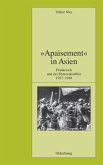Drawing on recent studies of the links between empire, colonialism and genocide, Nazi Empire examines German history from 1871 to 1945 as an expression of the aspiration to imperialist expansion and the simultaneous fear of destruction by rivals. Acknowledging the important differences between the Second Empire, the Weimar Republic and the Third Reich, Shelley Baranowski nonetheless reveals a common thread: the drama of German imperialist ambitions that embraced ethnic homogeneity over diversity, imperial enlargement over stasis and 'living space' as the route to the biological survival of the German Volk. Drawing on recent studies of the links between empire, colonialism and genocide, Nazi Empire examines the history of Germany from 1871 to 1945 as an expression of the less well-known but nonetheless crucial 'tension of empire', the aspiration to imperialist expansion and the simultaneous fear of destruction by imperialist rivals.
Hinweis: Dieser Artikel kann nur an eine deutsche Lieferadresse ausgeliefert werden.
Hinweis: Dieser Artikel kann nur an eine deutsche Lieferadresse ausgeliefert werden.









